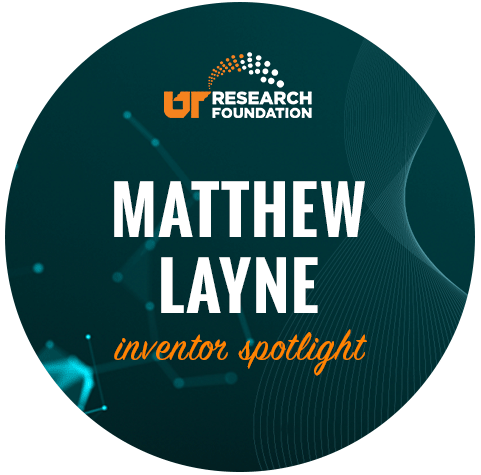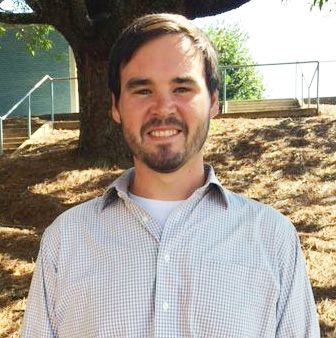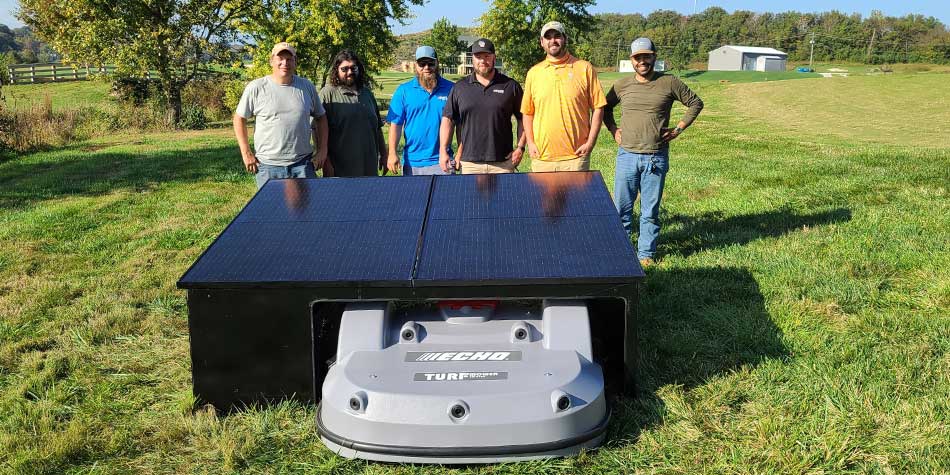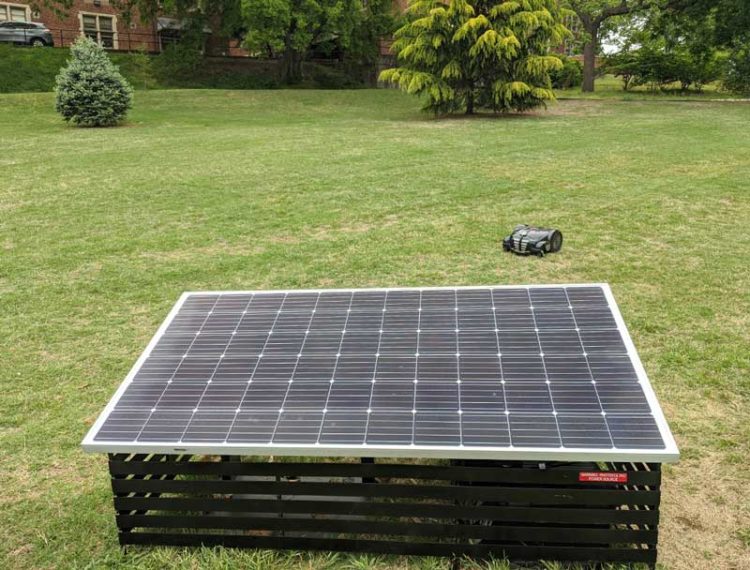 Local partnership results in creation of new solar charging technology for robotic mowers.
Local partnership results in creation of new solar charging technology for robotic mowers.
One University of Tennessee, Knoxville, staff member sought to solve a problem at work and ended up co-inventing a technology with a local solar company that may unlock new possibilities for the future of electrification.
Matthew Layne, co-inventor of a patent-pending, solar-powered charging station for robotic lawnmowers called Powershed, is the Turf Manager for UT Knoxville, where he maintains over 900 acres of property both on and off campus. In addition to his full-time job, Matthew is also pursuing a master’s degree in the Department of Plant Sciences.

In late 2019, Matthew wanted to purchase a robotic mower to solve an increasingly difficult maintenance challenge: One area of the university’s campus was so tough to access that his staff had to scale down a wall holding weed eaters to maintain it — a dangerous and time-consuming approach. A lack of available outlets in that area and his desire for a sustainable solution to this problem led Matthew to search for a small robotic mower equipped with a solar charging station. However, he soon discovered that this solution did not exist.
Matthew began reaching out to local solar companies in hopes of finding a willing partner to make the product he envisioned. Luckily, one Knoxville company, Solar Alliance, was up to the challenge. Matthew connected with Harvey Abouelata, Vice President of Commercial Solar, and Jon Hamilton, General Manager, and within a couple of months the team invented Powershed, transforming Matthew’s initial idea into a working product that was installed on UT’s campus.
The Powershed charging station is ideal for university campuses, corporate campuses, public parks, athletic fields, and golf courses. It incorporates a solar photovoltaic module into the structure of the charging station, which simplifies and improves the operation and use of robotic lawn mowers. Incorporating solar panels allows Powershed to run without tethering to a power grid, an added benefit for consumers who seek to reduce fossil fuel emissions or want to operate in more remote locations.

“Solar Alliance’s focus has been on electrification, so when Matthew came to us, I looked at it like a science project or case study for how we’re going to be able to help electrify mowers, blowers, and more,” said Harvey. “It didn’t register what we were doing until afterward.”
The team of inventors began discussing the possibility of patenting the solar charging station when they recognized the wide range of applications the technology could offer. From highway medians to airports, solar-charged robotic mowers could revolutionize the future of electrification by reducing carbon footprints, noise pollution, and safety concerns associated with these different use cases. Matthew explained that Powershed is a really exciting asset in someone’s tool bag that takes robotic mowers to places they couldn’t go before.
“I’ll be honest, when I first approached Solar Alliance about the idea, it had nothing to do with patents or selling Powersheds,” he continued. “I just wanted to find a solution for the issue to help my maintenance staff.”
 By chance, Harvey connected with a lawyer who advised him to seek help from UTRF, and in mid-2020, UTRF filed a provisional patent application with the U.S. Patent office for Powershed. By September 2020, Solar Alliance had signed a commercial license agreement with UTRF to develop and sell Powershed. The product is currently available through commercial distribution partners and direct sales. It is designed to meet demand through a scalable production model and Solar Alliance plans to pursue the possibility of sub-licensing to robotic lawnmower manufacturers as demand increases.
By chance, Harvey connected with a lawyer who advised him to seek help from UTRF, and in mid-2020, UTRF filed a provisional patent application with the U.S. Patent office for Powershed. By September 2020, Solar Alliance had signed a commercial license agreement with UTRF to develop and sell Powershed. The product is currently available through commercial distribution partners and direct sales. It is designed to meet demand through a scalable production model and Solar Alliance plans to pursue the possibility of sub-licensing to robotic lawnmower manufacturers as demand increases.
“Matthew is a great example of an inventor who identified a problem and quickly worked toward a solution,” said UTRF Vice President Maha Krishnamurthy. “UTRF is proud to partner with forward-thinking UT innovators, like Matthew, and local partners, like Solar Alliance, to advance technologies with commercial potential and positive future impact.”
Matthew, Harvey, and Jon are thankful for the support they have received from UTRF and are excited about the future of Powershed. They all also acknowledged the serendipitous series of events that first brought them together and then to UTRF.
“I never would have done anything with Powershed if it wasn’t for the fact that Solar Alliance was full of such good people — open and honest,” said Matthew. “I also wish more people knew about UTRF and the kind of help they can provide students, faculty, and staff. Not all places offer resources for staff members, but UTRF is happy to help everybody at UT.”